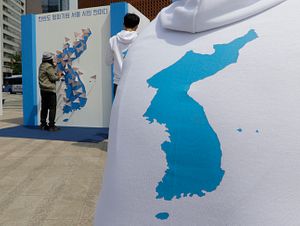South Korean President Moon Jae-in and North Korean leader Kim Jong-un are set to meet Friday in what will be the third inter-Korean summit and the first such meeting in over a decade. The summit is a part of North Korea’s surprise 2018 diplomatic outreach that also includes Kim’s meeting with Chinese leader Xi Jinping last month and a planned meeting with U.S. President Donald Trump in either May or June. As speculation ramps up on a possible peace treaty between the two Korean nations (which are technically still at war under an armistice agreement), South Korean public opinion polls show both optimism and reservations for inter-Korean relations.
In a survey conducted by South Korean polling firm Realmeter last week, nearly 78 percent of South Koreans favored the prospect of a peace agreement between the two Korean nations, with 14.5 percent opposed to the potential treaty. A strong majority of support for the possible agreement also remained across both geographic and age breakdowns. The poll results echo a similar 73 percent last month when South Koreans expressed support for the announced summit talks.
Despite the support for the possible agreement, South Koreans still remain largely skeptical of the North Korean regime’s sincerity. A Korea Gallup poll last month indicated that 64 percent of South Koreans think North Korea will never give up its nuclear program, with a similar percentage from another poll showing distrust for the North Korean regime.
In particular, young South Koreans in their 20s have consistently expressed wariness of North Korea in recent years. In an issue brief released last week by the Asan Institute for Policy Studies, the report’s authors noted that younger South Koreans in their 20s see North Korea as a “stranger” or “enemy” more than other age demographics and display more indifference to the idea of Korean reunification. With the growing economic, political, and cultural divide between the two Koreas, the numbers reflect the rising generation’s perceived distance from identifying with their Northern neighbors.
Having lived under the prospect of a North Korean military threat for over half a century, South Koreans are well aware of the pitfalls in dealing with their northern counterpart. However, many South Koreans value the significance of the inter-Korean talks and what it means for the future of both countries. Shortly after Kim Jong-un gave his New Year’s address stating his desire for a “peaceful resolution with our southern border,” only 28 percent of South Koreans believed that North Korea’s attitude had changed. After the summit announcement in March, the poll number nearly doubled to 53 percent of South Koreans.
As if to address skeptics, North Korea has already stated that they will not demand the withdrawal of American troops from the peninsula and announced last weekend that they would freeze nuclear and missile testing. The sincerity of the regime will be put to the test when Moon Jae-in greets Kim Jong-un in Panmunjeom on Friday, and South Koreans will be able to judge for themselves (on live television no less) what the meeting means for peace prospects in the decades-long conflict.
Junil “Juni” Kim is the program manager at the Korea Economic Institute of America.

































